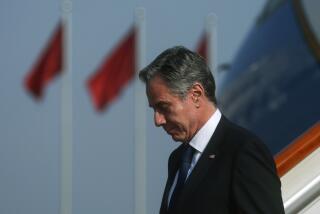Diplomatic Immunity Mustn’t Be License to Kill, Weinberger Says
- Share via
WASHINGTON — In the wake of terrorist incidents linked to foreign diplomats, Defense Secretary Caspar W. Weinberger called Thursday for an examination of diplomatic immunity and told a lawyers’ conference that “diplomatic title must not confer a license to murder.”
The secretary, whose views on countering terrorism have conflicted at times with those of Secretary of State George P. Shultz and others in the Reagan Administration, said the United States must steer clear of extreme solutions.
“A total crackdown may endanger the political liberties such action seeks to protect, (but) despair at ever defeating the terrorists can set in, paralyzing policy while it permits violence to spread,” said Weinberger, who in the past has advocated stricter limits than Shultz has suggested on the use of force against terrorism.
Weinberger, in a speech prepared for delivery to the American Bar Assn. National Conference on Law in Relationship to Terrorism, criticized those embassies that allow themselves to be used as bases for terrorist operations while claiming protection under international law.
Terrorist Arsenals
“Embassies are used as terrorist arsenals and planning centers, and so-called ‘diplomats’ actually plan and orchestrate murders and bombings in the nations hosting them,” Weinberger said. “Yet, under the prevailing law of diplomatic immunity, the embassy is a sanctuary; there is no recourse against the so-called ‘diplomat’ except expulsion.”
His remarks were his first extensive public comment on terrorism since a bomb killed an American serviceman and a Turkish woman at a West Berlin discotheque April 5. It was that attack, which the Administration said was tied by intelligence reports to a support operation in Libya’s embassy in East Berlin, that led to the U.S. bombing raid on Libya on April 15.
In other incidents, authorities in Rome have linked diplomats assigned to the city’s Libyan Embassy--known as the People’s Bureau--to other terrorist efforts in 1985; Turkish prosecutors have linked the Libyan mission in Ankara to a foiled attempt to blow up an American officers’ club in that city in April, and British authorities questioned Syrian diplomats in connection with the unsuccessful effort to plant a bomb aboard an El Al Israel Airlines jumbo jet at London’s Heathrow Airport two months ago.
Question of Privilege
“I think we should examine, very carefully, the whole idea of diplomatic privilege extending to support of terrorism,” Weinberger said, adding that diplomatic immunity can be preserved “without cloaking terrorists in those privileges.”
The concept of diplomatic immunity has been traced to ancient times. The United States adheres to the 1961 Vienna Convention, which codified the concept in international law with the intention of protecting diplomats from arrest in foreign lands.
Although Weinberger mentioned none of the recent incidents in which embassies were tied to terrorist acts, he referred to an incident in 1984 in which Libyans inside their embassy in London fired on exiles outside the building and killed a British policewoman.
“Under such circumstances, I submit there are limits to the doctrine of diplomatic immunity,” he said. “The task remains for our diplomats with the assistance of the legal profession to define those limits. Diplomatic title must not confer a license to murder.”
More to Read
Sign up for Essential California
The most important California stories and recommendations in your inbox every morning.
You may occasionally receive promotional content from the Los Angeles Times.













